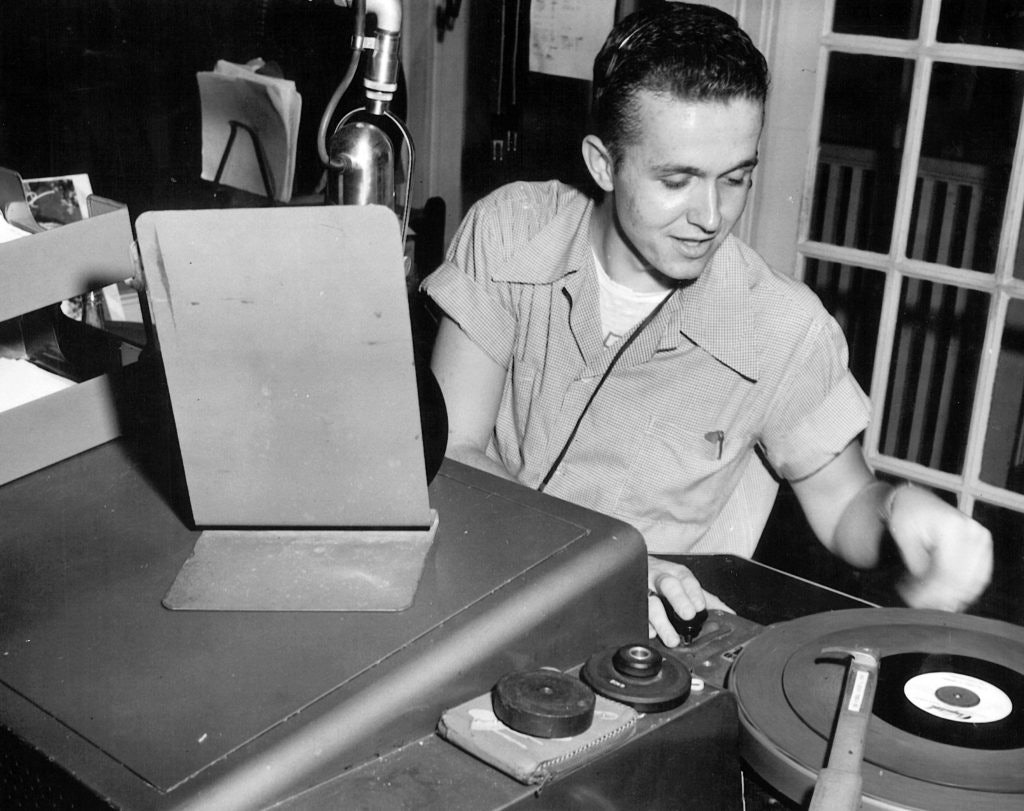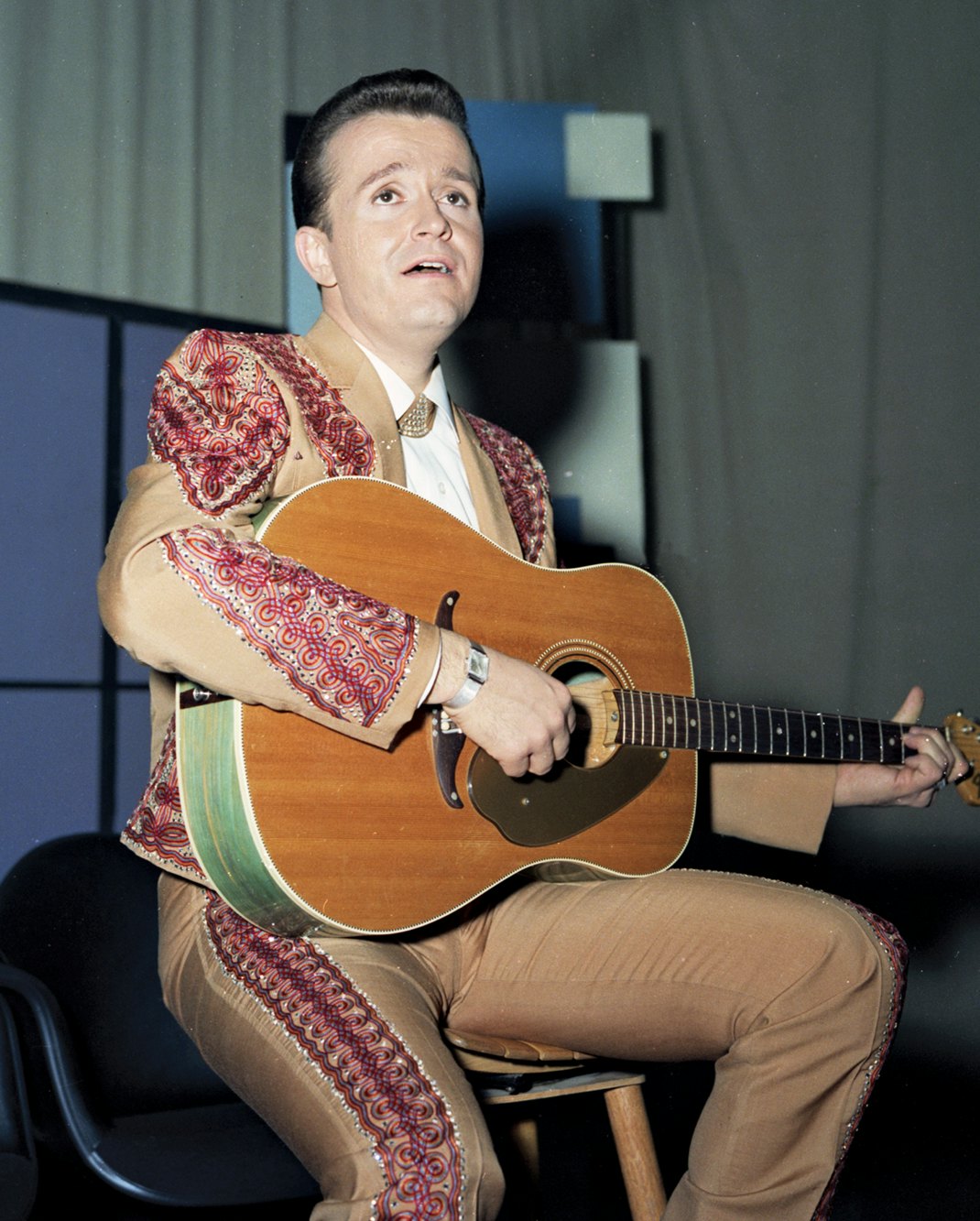
Bill Anderson: As Far As I Can See
All Day
An exploration of the Country Music Hall of Fame member’s life and musical legacy, from childhood through his contributions as one of the most decorated recording artists, songwriters, and entertainers in history.
Country Music Hall of Fame member Bill Anderson’s love of music is rivaled but not eclipsed by his love of baseball, particularly, the Atlanta Braves. From attracting major league attention as a pitcher for his high school team to assembling star-studded softball games for charity, Anderson’s interest in America’s pastime runs deep. So much so that he’s befriended numerous Braves players, coaches, and staff members throughout the years.
Watch above to hear from Jim Lovell, Senior Director of Team Travel for the Atlanta Braves, and country music superstar, Trisha Yearwood, whose father bonded with Anderson over music as well as their love of the game.
Known as “Whisperin’ Bill” for his soft-spoken and conversational singing style, Bill Anderson has placed eighty records on the Billboard charts as a recording artist, reaching country’s Top Twenty more than forty times. As a songwriter, he’s placed songs on the country charts in seven consecutive decades.
About Bill Anderson
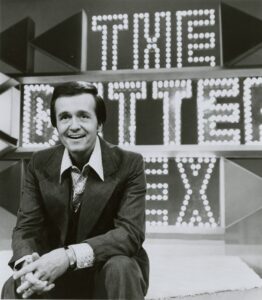
James William Anderson III was born on November 1, 1937, in Columbia, South Carolina. He was fascinated by music from the age of three and as a youngster spent hours listening to country music on the radio. In late 1945, when Anderson was eight, the family moved to Georgia, settling near Atlanta, in Decatur. He learned the guitar and wrote his first song by age 11.
In high school, he formed a band and the group took first place in his school’s talent show on the strength of one of his self-penned songs. But at the time, Anderson was as interested in writing and sports as he was in music. He was a baseball pitcher at Avondale High, while also writing stories about sports for Decatur’s DeKalb New Era newspaper.
Anderson entered the University of Georgia in 1955, where he studied journalism and began working as a disc jockey at local radio stations.
After recording his own composition, “City Lights,” in 1957 for Texas-based TNT Records, the song eventually made its way to Country Music Hall of Fame member Ray Price, who took his own version to the top of Billboard’s country charts in 1958.
Anderson soon graduated college, signed to Decca Records, and began his long string of hit recordings with famed record producer and Country Music Hall of Fame member Owen Bradley in Nashville, Tennessee. Anderson wrote many of his hits himself—“The Tip of My Fingers,” “Walk Out Backwards,” “Po’ Folks,” “Mama Sang a Song,” “Still” and “Bright Lights and Country Music,” among many others.
Anderson also played a major role in launching Country Music Hall of Fame member Connie Smith’s career after hearing her perform at a talent show he was judging. He wrote her debut hit, “Once a Day,” and introduced her to RCA’s Nashville chief and Country Music Hall of Fame member Chet Atkins, who signed her to the label.
Television and Duets
At the beginning of 1965, Anderson began hosting the syndicated TV program The Bill Anderson Show, a widely aired country music showcase. When popular singer Jan Howard joined The Bill Anderson Show in 1966, she and Anderson began recording successful duets together, including four Top Five country hits and four Decca albums between 1968 and 1972.
Meanwhile, Anderson’s ease and ready wit on camera led to more television opportunities. He began appearing on Match Game, Tattletales, Password, Hollywood Squares, and other daytime game shows, and even hosted The Better Sex game show on ABC. He also acted in soap operas, including ABC’s One Life to Live.
A Second Career
After spending years in the limelight as a recording artist and entertainer, Anderson struggled with bouts of writer’s block and feelings of inadequacy in the 1980s. In the 1990s, however, he began co-writing with artists and songwriters, including Country Music Hall of Fame member Vince Gill and Steve Wariner.
His name turned up again on the country charts in 1995 with “Which Bridge to Cross (Which Bridge to Burn),” which was co-written with and recorded by Gill. A songwriting renaissance followed. Anderson rounded out the century with two more hits, “Wish You Were Here” by Mark Wills and the Grammy-nominated “Two Teardrops” by Wariner.
A slew of hits continued into the 2000s, including “Whiskey Lullaby,” a ballad Anderson co-wrote with singer-songwriter Jon Randall Stewart about alcoholism and suicide recorded by Brad Paisley and Alison Krauss. In 2002, Anderson was also honored with Broadcast Music Inc.’s inaugural BMI Icon Award for the genre of country music. “Whiskey Lullaby” went on to sell two million copies and won the 2005 Country Music Association Song of the Year award.
Its success was followed by 2006’s “Give It Away,” a #1 hit for George Strait that Anderson wrote with Jamey Johnson and Buddy Cannon. It won Song of the Year designations from both the CMA and the Academy of Country Music.
Still Going Strong
Anderson remains an active force on Nashville’s Music Row. In recent years, he has completed several solo albums, collaborated with Country Music Hall of Fame members Bobby Bare and Dolly Parton on new album tracks, and has even written songs via Zoom with Brad Paisley during the pandemic. He continues to serve as a performer and beloved ambassador for the Grand Ole Opry.
In addition to his induction into the Country Music Hall of Fame in 2001, he’s been inducted into the National Songwriters Hall of Fame (2018) and several other halls of fame. In 2021, Connie Smith’s 1964 recording of his song “Once a Day,” was added to the Library of Congress’s National Recording Registry, alongside works by Hank Williams, Bob Dylan, Irving Berlin, and other songwriting greats.
Live at the Hall
“Bill Anderson: Live at the Hall,” captured on stage at the museum, offers a deep, personal dive into the Country Music Hall of Fame member and Grand Ole Opry mainstay’s singular life and career, complementing and expanding on the rich storytelling in the exhibition.
Bill Anderson Exhibit Highlights
-
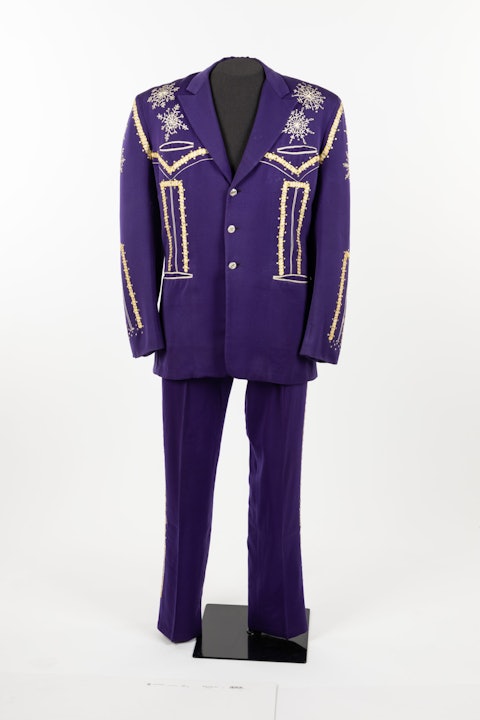
In the early 1960s, Anderson purchased his stage costumes—including this suit embellished with piping, rhinestones, and embroidered snowflakes—by mail-order from S.A. Formann, a Buffalo, New York-based tailor.
-
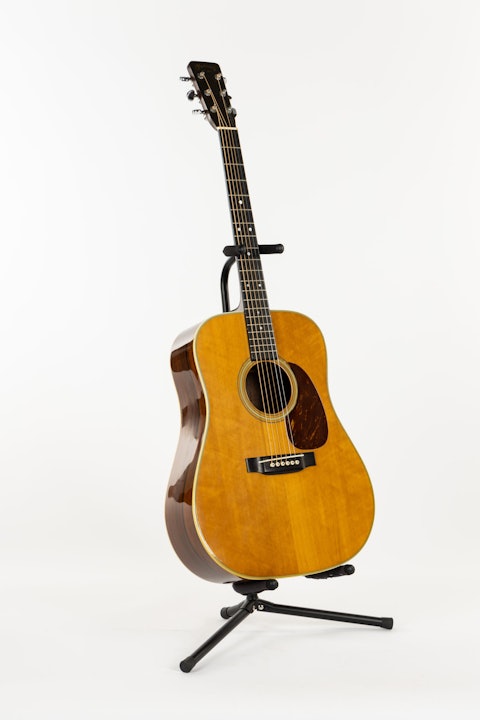
Anderson’s 1958 Martin D-28 that he called his “second voice.” He used the guitar extensively on stage, in the studio, and to write songs, including “Still,” “The Tips of My Fingers,” “Po’ Folks” and “Once a Day.”
-
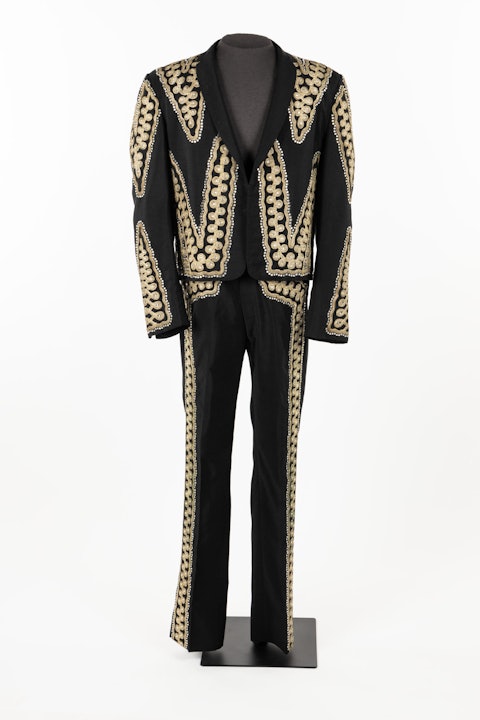
Nudie’s Rodeo Tailors designed this suit, embellished with elaborate chain-stitch embroidery and rhinestones, for Anderson in the 1960s.
-
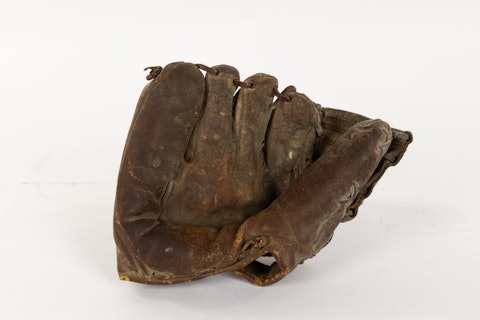
Anderson’s Rawlings leather glove used when he was a pitcher for Avondale High School’s baseball team, circa 1955
-
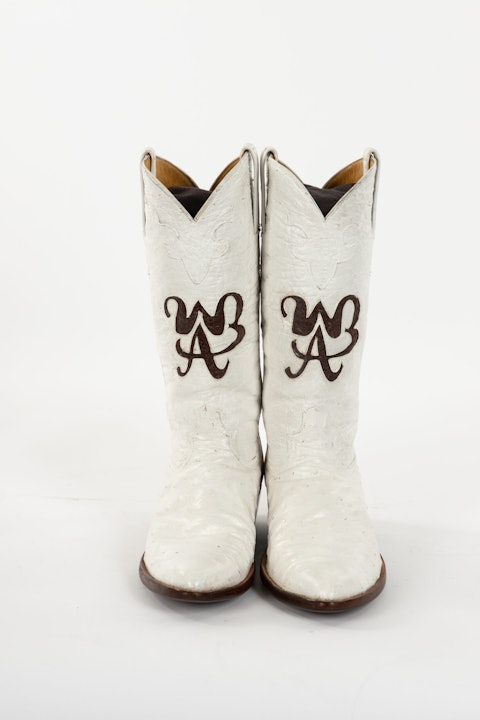
Custom-made boots by L.M. Easterling Custom Boot Company, embellished with the initials “WBA”—for Whisperin’ Bill Anderson
-
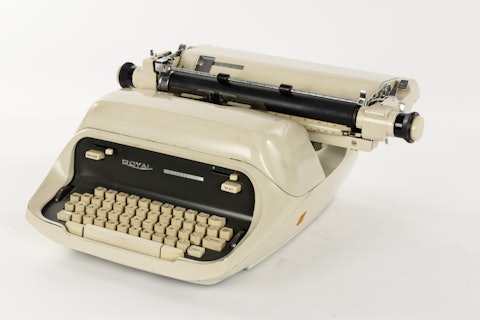
The Royal electric typewriter used in the 1960s by Anderson to type song lyrics and answer fan mail
-
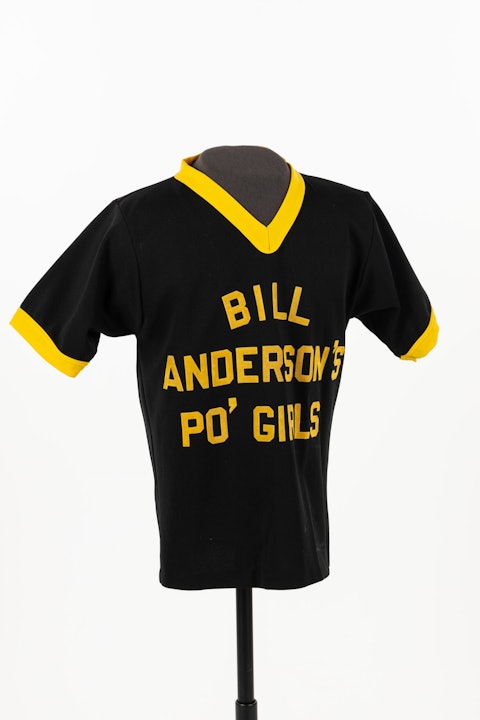
On the road in the 1970s, Anderson organized his musicians, their spouses, and other members of his crew into softball teams—the Po’ Boys and Po’ Girls—as an outlet for pent-up energies, while publicizing his shows and raising money for local charities. On afternoons before their shows, Anderson and his teams—dressed in black and gold jerseys—competed against local disc jockeys and musicians.
-
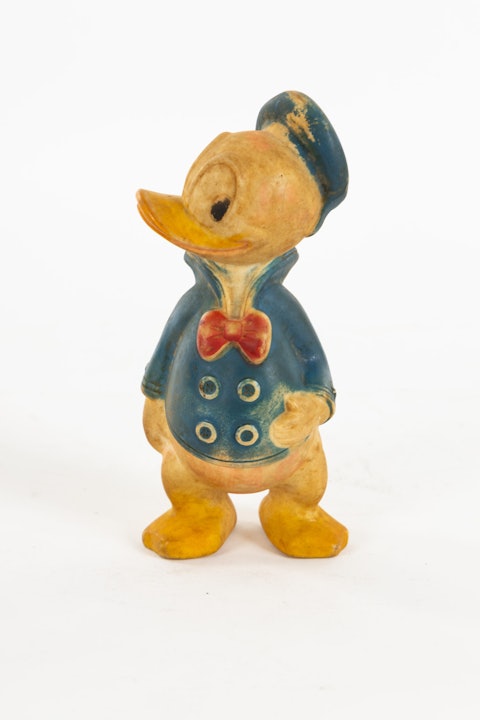
When Anderson worked as a disc jockey at Commerce, Georgia station WJJC in 1957, this rubber duck was his on-air sidekick on his daily radio show. He would squeeze Josh Waddlesforth McDuck—as his popular co-host was named—to make it squeak, then Anderson would interpret for his listeners what it was saying.
-
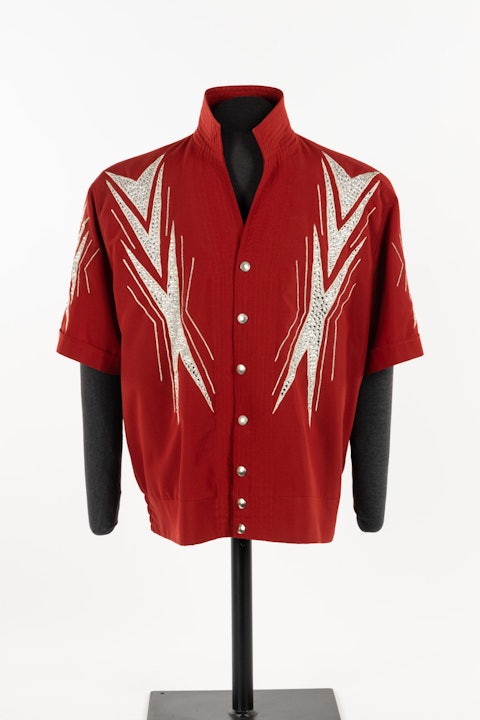
A Manuel shirt, embellished with rhinestones and metallic embroidery, designed for Anderson in the 1990s





